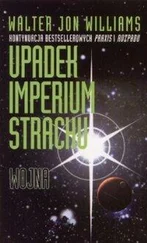Walter Williams - Deep State
Здесь есть возможность читать онлайн «Walter Williams - Deep State» весь текст электронной книги совершенно бесплатно (целиком полную версию без сокращений). В некоторых случаях можно слушать аудио, скачать через торрент в формате fb2 и присутствует краткое содержание. Жанр: Киберпанк, на английском языке. Описание произведения, (предисловие) а так же отзывы посетителей доступны на портале библиотеки ЛибКат.
- Название:Deep State
- Автор:
- Жанр:
- Год:неизвестен
- ISBN:нет данных
- Рейтинг книги:5 / 5. Голосов: 1
-
Избранное:Добавить в избранное
- Отзывы:
-
Ваша оценка:
- 100
- 1
- 2
- 3
- 4
- 5
Deep State: краткое содержание, описание и аннотация
Предлагаем к чтению аннотацию, описание, краткое содержание или предисловие (зависит от того, что написал сам автор книги «Deep State»). Если вы не нашли необходимую информацию о книге — напишите в комментариях, мы постараемся отыскать её.
Deep State — читать онлайн бесплатно полную книгу (весь текст) целиком
Ниже представлен текст книги, разбитый по страницам. Система сохранения места последней прочитанной страницы, позволяет с удобством читать онлайн бесплатно книгу «Deep State», без необходимости каждый раз заново искать на чём Вы остановились. Поставьте закладку, и сможете в любой момент перейти на страницу, на которой закончили чтение.
Интервал:
Закладка:
And Tuna-whom Dagmar had last seen hustling in the direction of the Grand Bazaar-would be clean once he broke the SIM card and dumped the phone in some convenient receptacle.
He was a writer and translator. He lived in Istanbul. He had every excuse for being where he was.
When the police finally fought their way through the traffic tangle, there were only a few pedestrians on the square, along with the flowers and photos and pushcart vendors.
No demonstration, no riot, no reason for police to be there at all.
Dagmar looked at Lincoln standing across the room, standing with a cup of coffee in his hand. He looked at her and silently mouthed a pair of words.
Insanely fun.
She nodded. Yes. It was. She bent over her keyboard.
As soon as Tuna was safely away, she was busy supervising the viewing, editing, and distribution of the masses of video that had been collected during the demo. These were edited into ten- and fifteen-second clips for distribution to television outlets, while the rest was uploaded onto sites with names like downwiththedictators.org and restoretheconstitution.net. The videos were edited slightly, to make the crowd look bigger than it was or to blur images where faces were too recognizable.
Most of the job, however, was out of her hands. The images and video taken by the demonstrators themselves would soon be everywhere, viewed on file-sharing and social-networking sites, sent from one phone to the next, used as wallpaper, submitted to media.
No one had died. It was possible that no one would even be arrested.
The proof-of-concept had proved itself.
The concept showed that action against the government was possible, that it would be seen, and that it would be safe. It showed that you, too, could prank the government.
You could make your overlords ridiculous. And all you’d need would be access to a computer, and a cell phone.
They had promised to make the nation safe from people like you, but you could make them liars.
The fact that the demo hadn’t, objectively speaking, accomplished anything was irrelevant. No buildings were occupied, no security agencies compromised; no centers of power were seized.
All that would happen later.
The next stage was to make the military government irrelevant. Not merely to congregate at but to occupy public spaces and public buildings and meanwhile flood all media channels with propaganda, urging everyone-the security forces in particular-to join them.
That was the essence of the people power revolt-to walk away from the established government and set up your own, virtual government. If the majority of the population chose to recognize the virtual government rather than the traditional one, the generals would end up alone in their palace, trying to get someone to take their phone calls while their own televisions broadcast a message transmitted by their enemies. Recent history was loaded with examples, iconic moments in the transition of power: Enrile crossing EDSA from Camp Aguinaldo; Yeltsin standing atop a tank in front of the Russian White House; Ljubisav?okic? charging the Belgrade broadcast station on his bulldozer; a crowd of Georgians, armed with nothing but roses, driving Eduard Shevardnadze from his own parliament building; Yuschenko taking the presidential oath in a half-deserted room in Ukraine…
All moments when tyranny cracked.
It wasn’t a question of whether the generals would use force to maintain their position. That was a given. They’d taken power through a coordinated series of assassinations of journalists, politicians, Christian missionaries, intellectuals, labor leaders, and Kurdish heroin dealers. Presumably they would not be overly disturbed if their tanks’ treads were dyed red by the crushed bodies of their enemies.
But the tank drivers were another matter. They were vulnerable to propaganda, and more important, they were vulnerable to their own humanity. Once the generals’ instruments of power refused their orders, the generals were finished.
In the Philippines, in Serbia, in Georgia and Ukraine, the tank drivers had balked. In Iran and China and Burma, the tankers had obeyed orders.
Dagmar looked around the room in a sudden surge of joy.
We are like ourselves, she thought, and no one else.
Within an hour, a bouquet of flowers and a photo of an anonymous seascape had been nailed to the wall of the ops room, just beneath Ataturk’s ferocious gaze.
After everything had been collaged together, the demo would be re-created in an augmented reality environment. People could go to Beyazit Square, now or at any point in the future, and if they wore the right goggles or had the right app for their handheld or had the proper helmet with a heads-up display, they would see the demonstration superimposed on the environment. They could participate vicariously in the demo; they could walk through it as if it were actually happening in their present.
They could lay flowers and photographs on the ground and photograph them and then upload them to the AR site, where the pictures would be added to the virtual environment.
It was possible that more people would participate in the demo afterward than were present at the actual event.
For years after the demo-perhaps forever-the AR of the demo would be available to anyone with the right equipment. People taking a picture of the university’s baroque gate would see an icon on their phone, or people scrolling along a map of Istanbul would see a symbol and click it, and instantly the demonstration would come to life, flowers and photos and bemused pushcart vendors.
Perhaps they would know it as the moment that Turkey began its entry into the twenty-first century. Or perhaps it would be known as another moment of false hope before the advance was turned back.
But in any case the monument was there, gleaming in the electronic world that lives alongside your own, eternal and evolving, and whatever the Bozbeyli regime did, they could not erase it.
Have you considered switching to Cankaya Wireless Network? Our customer service is the reason why we are the fastest-growing network in the Turkish-speaking world!
This link will direct you to a site for our new drawing. Anyone joining our network in the next few days will be eligible to win either a DVD or a beautiful Turkish towel!
Hurry to sign up. The next drawing will take place at 1700 on Saturday!
There was a grinding sound as the sea came over the shingle, the sound of thousands of small stones tumbling. The sea reached for Dagmar’s sandals with foam fingers, failed, withdrew. Stone rattled again on stone. The air tasted of iodine and salt.
“And there,” said Ismet, pointing, “the goddess was born.”
White clouds tumbled on the horizon. A great ruddy rock reared up above the shingle beach, ran to the water’s edge, then fell to the sea. Just offshore was a pair of huge stones, one large and craggy, one smaller and phallic. Maybe there had only been one giant rock on the day when Paphian Aphrodite had risen from the foam, here where the foam after many ages still, perpetually, anointed her birthplace.
There were only a few people on the beach, but they came in pairs. Even now Aphrodite attracted courting couples.
Visions of the Botticelli Birth of Venus floated in Dagmar’s mind. The delicate Italian scene, seashell and Boreals, the welcoming nymph or goddess or whatever she was in her spangled dress, and the improbably long-necked Venus herself, draped in her own red-gold hair… all these imagined elements were too delicate to have actually taken place in this primal landscape, all sea and wind and stark stone.
If a goddess ever landed here, a goddess shaped by this landscape, the ground would have shaken beneath her footfalls.
“Aphrodite was worshiped here since at least 3800 BCE,” Ismet said. Dagmar considered the dates.
Читать дальшеИнтервал:
Закладка:
Похожие книги на «Deep State»
Представляем Вашему вниманию похожие книги на «Deep State» списком для выбора. Мы отобрали схожую по названию и смыслу литературу в надежде предоставить читателям больше вариантов отыскать новые, интересные, ещё непрочитанные произведения.
Обсуждение, отзывы о книге «Deep State» и просто собственные мнения читателей. Оставьте ваши комментарии, напишите, что Вы думаете о произведении, его смысле или главных героях. Укажите что конкретно понравилось, а что нет, и почему Вы так считаете.











